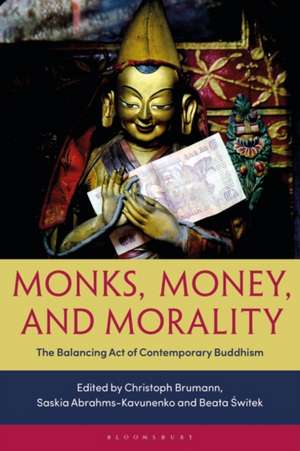Monks, Money, and Morality: The Balancing Act of Contemporary Buddhism
Editat de Christoph Brumann, Saskia Abrahms-Kavunenko, Beata Switeken Limba Engleză Paperback – 19 mai 2021
| Toate formatele și edițiile | Preț | Express |
|---|---|---|
| Paperback (1) | 159.99 lei 3-5 săpt. | +28.58 lei 7-11 zile |
| Bloomsbury Publishing – 19 mai 2021 | 159.99 lei 3-5 săpt. | +28.58 lei 7-11 zile |
| Hardback (1) | 468.48 lei 6-8 săpt. | +46.77 lei 7-11 zile |
| Bloomsbury Publishing – 19 mai 2021 | 468.48 lei 6-8 săpt. | +46.77 lei 7-11 zile |
Preț: 159.99 lei
Preț vechi: 173.62 lei
-8% Nou
Puncte Express: 240
Preț estimativ în valută:
30.62€ • 33.25$ • 25.72£
30.62€ • 33.25$ • 25.72£
Carte disponibilă
Livrare economică 01-15 aprilie
Livrare express 18-22 martie pentru 38.57 lei
Preluare comenzi: 021 569.72.76
Specificații
ISBN-13: 9781350213760
ISBN-10: 1350213764
Pagini: 264
Ilustrații: 8 bw illus
Dimensiuni: 156 x 234 x 18 mm
Greutate: 0.36 kg
Editura: Bloomsbury Publishing
Colecția Bloomsbury Academic
Locul publicării:London, United Kingdom
ISBN-10: 1350213764
Pagini: 264
Ilustrații: 8 bw illus
Dimensiuni: 156 x 234 x 18 mm
Greutate: 0.36 kg
Editura: Bloomsbury Publishing
Colecția Bloomsbury Academic
Locul publicării:London, United Kingdom
Caracteristici
Considers the economic basis of Buddhism from a very practical perspective, and all chapters are based on extensive ethnographic fieldwork by scholars familiar with the local language and culture.
Notă biografică
Christoph Brumann is Head of Research Group at the Max Planck Institute for Social Anthropology, Halle, and Honorary Professor of Anthropology at Martin Luther University Halle-Wittenberg, Germany.Saskia Abrahms-Kavunenko is a Marie Sklodowska-Curie Fellow at the University of Copenhagen, Denmark.Beata Switek is Assistant Professor of Japanese Studies at the University of Copenhagen, Denmark.
Cuprins
Introduction: Balancing Sangha Economies, Saskia Abrahms-Kavunenko, Christoph Brumann and Beata SwitekPart I: Reciprocity, Money and Trust1. Economic Agency and the Spirit of Donation: The Commercialization of Buddhist Services in Japan, Beata Switek (University of Copenhagen, Denmark)2. Merit, "Corruption," and Economy in the Contemporary Thai Sangha, Thomas Borchert (University of Vermont, USA)3. Ritual Virtuosity, Large-Scale Priest-Patron Networks and the Ethics of Remunerated Ritual Services in Northeast Tibet, Nicolas Sihlé (Centre d'Etudes Himalayennes, CNRS, France)4. 'Bad' Monks and Unworthy Donors: Money, (Mis)Trust and the Disruption of Sangha-Laity Relations in Shangri-La, Hannah Rosa Klepeis (Max Planck Institute for Social Anthropology, Halle, Germany)Part II: Beyond Reciprocity5. Donations Inversed: Material Flows from Sangha to Laity in Post-Soviet Buryatia, Kristina Jonutyte (University of Vilnius, Lithuania)6. Exorcising Mauss' Ghost in the Western Himalayas: Buddhist Giving as Collective Work, Martin Mills (University of Aberdeen, UK)Part III: Managing Temples and Monasteries7. Monks and the Morality of Exchange: Reflections on a Village Temple Case in Southwest China, Roger Casas (Austrian Academy of Sciences, Austria)8. Wealthy Mendicants: The Balancing Act of Sri Lankan Forest Monks, Prabhath Sirisena (University of Colombo, Sri Lanka)9. Monastic Business Expansion in Post-Mao Tibet: Risk, Trust and Perception, Jane Caple (University of Copenhagen, Denmark)Part IV: Capitalism, Decline and Rebirth10. Regeneration and the Age of Decline: Purification and Rebirth in Mongolian Buddhist Economies, Saskia Abrahms-Kavunenko (University of Copenhagen, Denmark)11. Saintly Entrepreneurialism and Political Aspirations of Theravadin Saints in Mainland Southeast Asia, Alexander Horstmann (University of Tallinn, Estonia)BibliographyIndex
Recenzii
Monks, Money, and Morality provides intimate cases studies from around the Buddhist world to show the complex consideration of money and ethics that monks must negotiate for their temples to survive. It offers insights into the way in which national politics and economics affect the practicalities of those seeking to pursue a monastic life. This eye-opening study will change perceptions of Buddhism and understandings of the role of monks in their communities.
At the heart of Buddhism stands the relationship between monastics and laypeople. These diverse and fascinating case studies, with their sophisticated ethnographic analyses, demonstrate that what is often thought of as an asymmetrical and hierarchical symbiosis is, in actually existing Buddhism, far more complex, far more variable, and far more interesting than that.
The book is very much about the dilemmas that a religious tradition faces when it comes to issues of money, exchange and incorporation into the capitalist economy ... a very rich collection of studies.
At the heart of Buddhism stands the relationship between monastics and laypeople. These diverse and fascinating case studies, with their sophisticated ethnographic analyses, demonstrate that what is often thought of as an asymmetrical and hierarchical symbiosis is, in actually existing Buddhism, far more complex, far more variable, and far more interesting than that.
The book is very much about the dilemmas that a religious tradition faces when it comes to issues of money, exchange and incorporation into the capitalist economy ... a very rich collection of studies.
